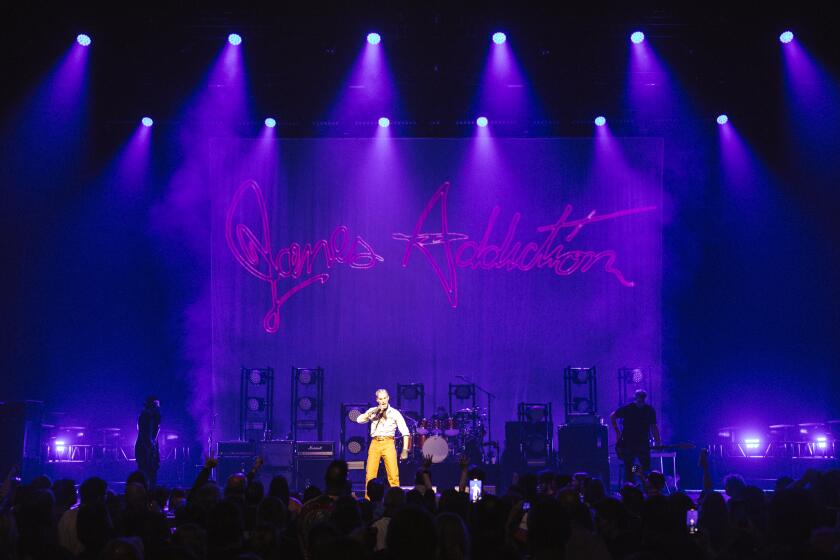Pat Benatar for the Sunday Conversation
At 57, Malibu-based girl rock pioneer Pat Benatar is as busy as ever. The four-time Grammy Award-winning vocalist behind such monster hits as 1979’s “Heartbreaker” and 1980’s “Hit Me With Your Best Shot” is on tour with REO Speedwagon, and her memoir, “Between a Heart and a Rock Place,” was released by William Morrow this month.
What was it like being a woman in rock in the ‘70s and ‘80s?
It was difficult because there was a lot of rampant sexism, except in the band I was playing in. I was chased around a piano, and radio stations especially were problematic. When the first record came out, I’d go down to radio stations pretty much every day to get the record played, and I would walk in and they’d tell us how much they loved the record, but they weren’t sure how much they could play it because they were already playing a girl. Or the program director would slap his leg and say, “Why don’t you sit down over here and we’ll see if we can get that record played.”
What did your record label do that made you feel like “an indentured servant,” as you wrote in your book?
Chrysalis had us signed to a schedule of having a record released every nine months. It was an absolutely ridiculous schedule. My longtime attorney [in New York] passed away, and when he did, I hired new attorneys from California. Miraculously, they found that our record contract had been signed in California and we’d been signed for 10 years, and there was a law in California that said a person can’t be signed to a service contract for more than seven years. Our attorneys put the seven-year clause into effect, which meant we were released from our contract. And that was a glorious day; it was like being let out of prison.
Can you talk about slapping the head of Chrysalis, Terry Ellis?
This happened during the “Get Nervous” record. We had three records under our belt at this point, and we were well beyond being novices, but Terry didn’t want to loosen up the reins ever. I wanted to shoot a cover that would push the envelope and move away from the sexy image a little bit. I shot this crazy cover in a padded room with my hair all nuts and red eye shadow. It still looked good, but it was certainly not what they’d consider my sex symbol image. He called me and said, “We’re not doing it, and I’m coming down there.” The gist of the conversation was that he was telling me I was an idiot. And he started telling me how foolish American women were, they had such issues with their sexuality and being beautiful. “I hope you don’t actually think they’re coming to hear you sing.” And I just lost it and I just slapped him because I couldn’t take it anymore.
It really is amazing to outsiders to hear they were so abusive to someone who was making them so much money.
I was incredulous all the time. Every month we’d have these huge board meetings, and there would be 12 or 15 record company executives from every branch of the company. And there would be maybe one or two women at the table besides me. And we’d talk about videos, what we were doing, who would shoot it, how much money we were going to spend — lots of money was flying around that table. And some person would always lean across the table with that lascivious look in their eyes, saying, “What are you going to wear?”
And I’d go, “What?” And I would have to be the bad guy. It caused so much conflict, because my own people — my own manager, my own attorneys wouldn’t go, “Hey, that’s totally uncalled for.” Literally no one said a word.
How has aging affected your life in the music industry?
It really is a non-issue. Maybe I’m being naïve. Maybe in the middle — there’s kind of a middle when you’re in your 40s and people are expecting you to still be 20. But when you get to be my age, I think it’s revered. I think people look at you as an icon, and people are amazed that you have managed to stay around this long.
How has touring changed?
Not that much. I said to somebody the other day when something was going south with the sound equipment, “The entire world has moved forward and we’re still in the dark ages.” But the soul of touring and the heart of it is basically every day is like putting up a circus tent. All these crew members get up early in the morning, they put the show together, you go out there and you do it and the audiences come and you tear it down, get back on the bus. It’s like a traveling road show just like it’s always been, and that’s the party I really, really love.
But I imagine the hotels are better.
The hotels are very much better.
More to Read
The biggest entertainment stories
Get our big stories about Hollywood, film, television, music, arts, culture and more right in your inbox as soon as they publish.
You may occasionally receive promotional content from the Los Angeles Times.










